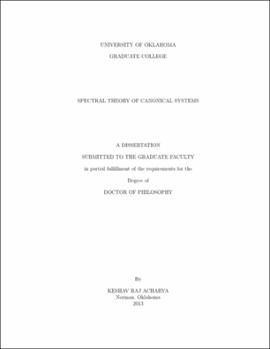| dc.contributor.advisor | Remling, Christian | |
| dc.creator | Acharya, Keshav Raj | |
| dc.date.accessioned | 2019-04-27T21:28:14Z | |
| dc.date.available | 2019-04-27T21:28:14Z | |
| dc.date.issued | 2013 | |
| dc.identifier | 99215716302042 | |
| dc.identifier.uri | https://hdl.handle.net/11244/318768 | |
| dc.description.abstract | The main purpose of this dissertation is to give an alternate proof of de Branges' theorem on canonical systems and to prove Remling's theorem on canonical systems. | |
| dc.description.abstract | In order to prove de Branges theorem, rst we show that, in the limit-circle | |
| dc.description.abstract | case, the defect index of a symmetric relation induced by a canonical system is constant on complex plane. Then this follows de Branges' theorem that a canonical system with trH = 1 implies the limit-point case. | |
| dc.description.abstract | As such, we develop spectral theory of a linear relation in a Hilbert space as a tool and use the theory to discuss spectral theory of a relation induced by a canonical system. | |
| dc.description.abstract | Next, we prove Remling's theorem on canonical systems. We follow the similartechniques of Remling from [14]. More precisely, we rst prove Breimesser-Pearson theorem on canonical systems, following the similar techniques from [3]. Then, we present the proof of Remling's theorem on canonical systems. We also show the connection between Jacobi and Schr odinger equations and canonical systems. | |
| dc.format.extent | 101 pages | |
| dc.format.medium | application.pdf | |
| dc.language | en_US | |
| dc.relation.requires | Adobe Acrobat Reader | |
| dc.subject | Spectral theory (Mathematics) | |
| dc.subject | Hilbert space | |
| dc.subject | Hamilton-Jacobi equations | |
| dc.subject | Schrödinger equation | |
| dc.subject | Quantum theory | |
| dc.title | Specral Theory of Canonical Systems | |
| dc.type | text | |
| dc.type | document | |
| dc.thesis.degree | Ph.D. | |
| ou.group | College of Arts and Sciences::Department of Mathematics | |
